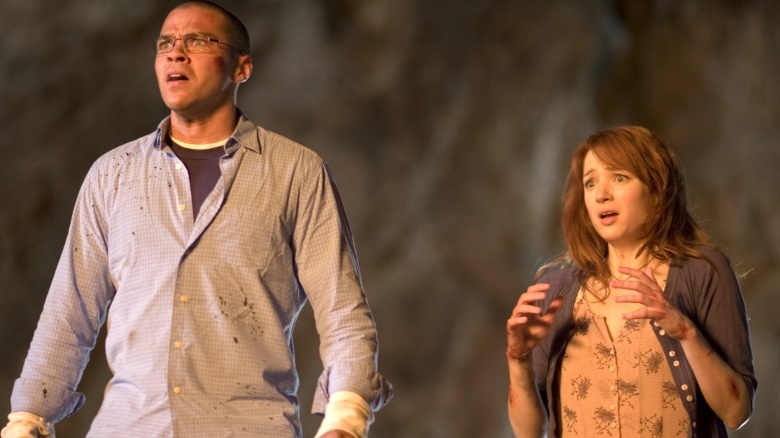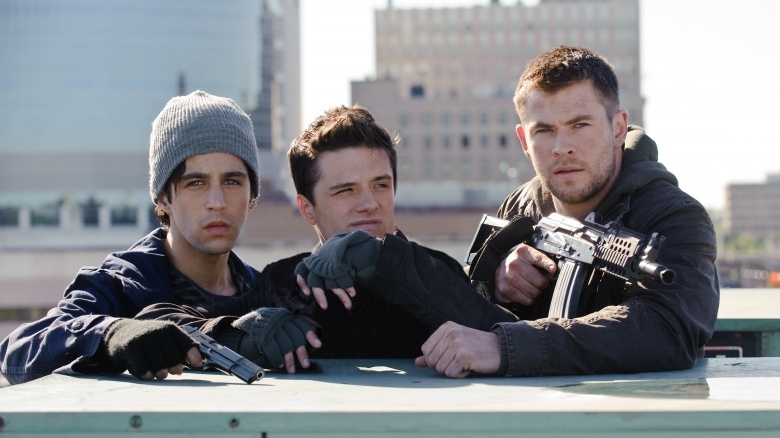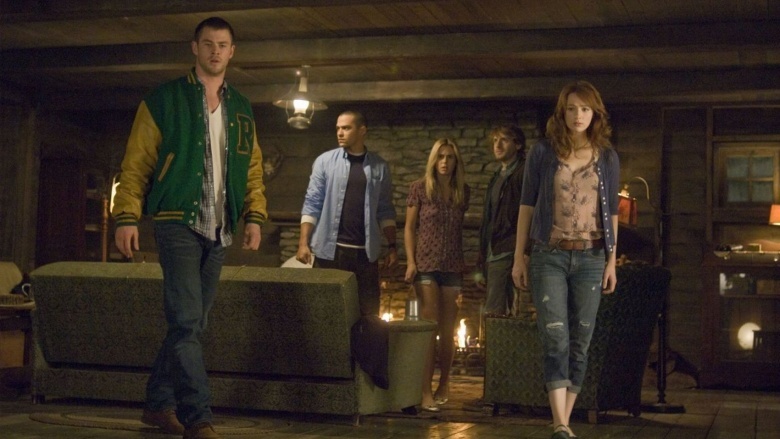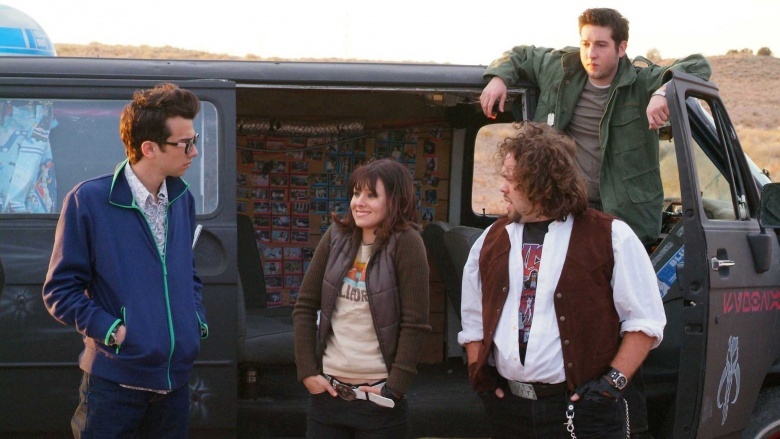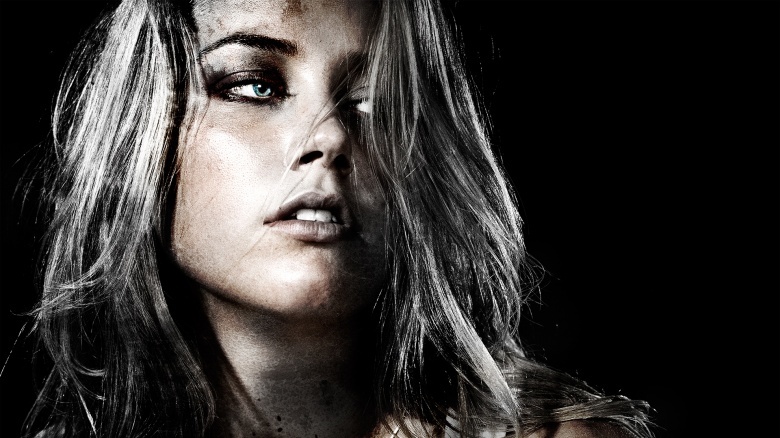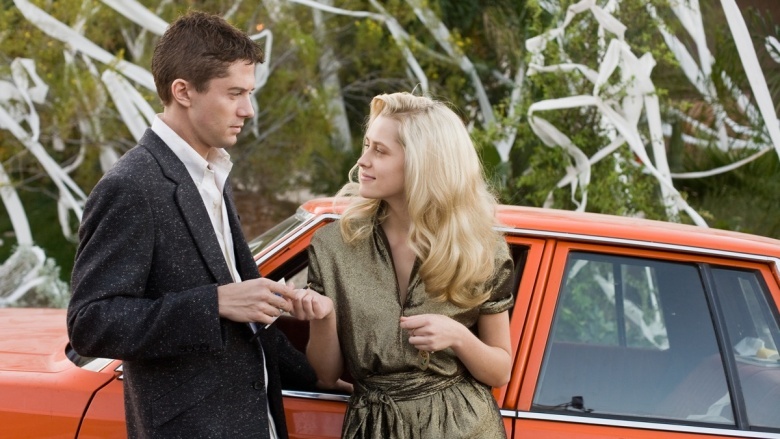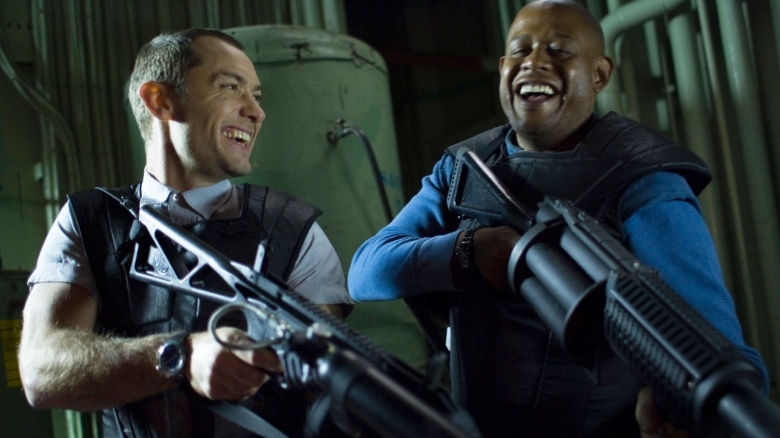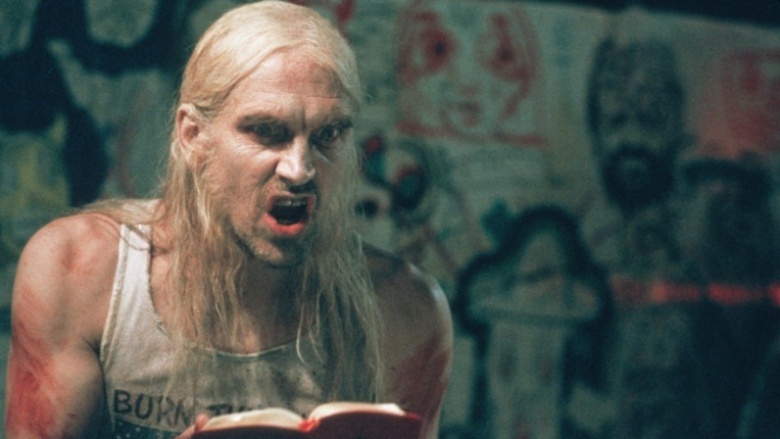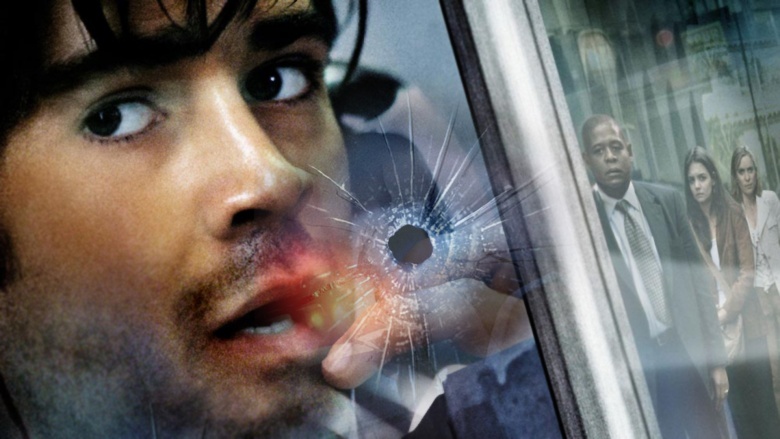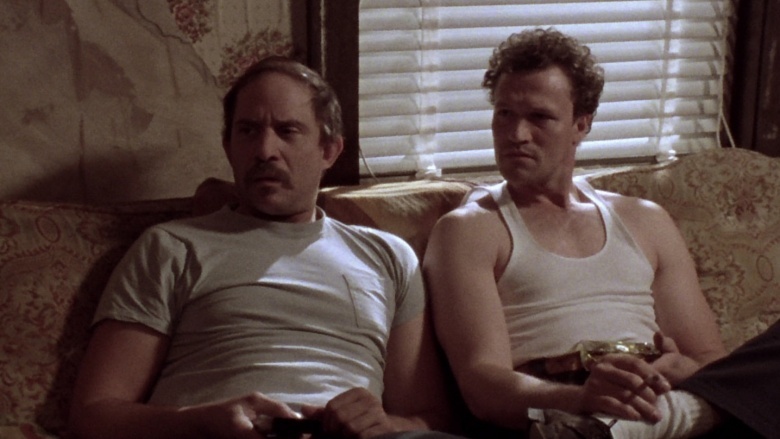The Real Reason These Movies Were Shelved For Years
Years can go by between a movie's initial announcement and its actual arrival in theaters, especially if the film in question is being eyed as a massive blockbuster. In fact, sometimes studios and distributors will shelve a movie outright if they believe it's in their best interest—for financial reasons, marketing reasons, or because a real-life event intruded on their plans. Audiences aren't always aware of these decisions, so with that in mind, we took a look at some movies that spent weeks, months, or even years waiting for their turn on the big screen.
Red Dawn (2012)
Remakes are a fact of life in Hollywood, and in the late 2000s, MGM made an attempt to stave off financial ruin by looking toward its deep vaults for potential titles to revisit. As part of this initiative, the studio hired Dan Bradley to helm a remake of John Milius' 1984 film Red Dawn, about a ragtag group of teenagers who mount a resistance against invading Soviet Union forces. Starring Chris Hemsworth, Josh Hutcherson, Adrianne Palicki, and Jeffrey Dean Morgan, among others, the remake was originally scheduled for release in 2010 but was shelved due to the studio's then-pending bankruptcy.
Unlike the original film, Bradley's remake focused on an invasion from China. However, during post-production, the studio opted to change the invading forces from Chinese to North Korean so they could release the film in China—the world's second-largest market for movies. The change included altering the original premise from China invading the U.S. after the country defaulted on its loans to a North Korean invasion following a European economic crisis that resulted in a weakened NATO alliance.
DMG Entertainment founder Dan Mintz, whose company specializes in distributing U.S. films in China, told the Los Angeles Times that "there would have been a real backlash" if MGM released the original version of the film. "It's like being invited to a dinner party and insulting the host all night long. There's no way to look good.... The film itself was not a smart move." Producer Tripp Vinson agreed, saying, "We were initially very reluctant to make any changes. But after careful consideration, we constructed a way to make a scarier, smarter and more dangerous Red Dawn that we believe improves the movie." Critics and audiences disagreed.
The Cabin in the Woods (2012)
Drew Goddard's satirical horror film The Cabin in the Woods (co-written and produced by Joss Whedon) is another Chris Hemsworth-led film that was tangled up in MGM's financial crisis in the late 2000s. Originally scheduled for release on February 5, 2010, the film didn't arrive in theaters until more than two years later, finally making its debut on April 13, 2012—less than one month prior to another Whedon-Hemsworth blockbuster, The Avengers.
After initially delaying The Cabin in the Woods so they could convert it to 3D, MGM shelved the film indefinitely after succumbing to its financial woes. Instead of pushing forward with a new distribution strategy, newly appointed chief executives Gary Barber and Roger Birnbaum chose to sell the movie (along with Red Dawn) to Lionsgate in 2011, who distributed the film the following year.
Despite its harrowing journey to the big screen, and although it wasn't a megahit at the box office, it stands to reason that Hemsworth starring in The Avengers (and a slew of solid reviews) elevated the release of The Cabin in the Woods.
Fanboys (2009)
Nowadays, people tend to use the once-affectionate term "fanboys" derogatorily to describe people who are unreasonably passionate about a particular subject or property. But Kyle Newman's 2009 comedy film is anything but derogatory—it's an affectionate exploration into the unyielding Star Wars fandom, and the length one would go to see a new Star Wars movie early.
Set in the late '90s (leading up to the release of Star Wars: Episode I — The Phantom Menace), Fanboys is about a group of friends who travel across the country, break into Skywalker Ranch, and attempt to see an early draft of the new Star Wars film, all because one of their friends is dying of cancer and may not live long enough to see it in theaters.
After seeing an early draft of Fanboys, George Lucas approved of the film and even allowed the studio to use the original Star Wars effects for it. The Weinstein Company then delayed the movie in order to shoot additional scenes, and since Newman couldn't return to oversee the reshoots, the studio hired Steven Brill to direct them. Brill then recut the film, removing the cancer subplot, and added in raunchier scenes at the company's behest.
Newman, and fans of the film who saw a rough cut at Star Wars Celebration 2007, launched a petition against the studio, protesting the new changes. The Weinstein Company folded months later and re-implemented the cancer subplot, and after a series of further delays, Fanboys finally arrived on February 6, 2009—two years after its initial release date.
All the Boys Love Mandy Lane (2013)
Jonathan Levine's horror film All the Boys Love Mandy Lane, starring Amber Heard as Mandy alongside a cast that included Michael Welch, Whitney Able, and Anson Mount, made its debut at the Toronto International Film Festival in 2006. Due to various issues, the film didn't screen in the U.K. until 2008—and it didn't arrive in U.S. theaters for seven years, finally making its American theatrical debut on October 11, 2013.
The Weinstein Company originally planned on releasing All the Boys Love Mandy Lane in 2007, but since Robert Rodriguez and Quentin Tarantino's double-feature Grindhouse failed to perform well at the box office, and since both films share a similar aesthetic, the studio chose to shelve the film indefinitely. They later sold the movie's rights to Senator Entertainment, who planned on releasing the film in 2008. Senator then shuttered, and the film's rights fell in limbo. When Mandy did finally secure a U.S. release, it turned out that most critics (and audiences) felt it really wasn't worth the wait.
Take Me Home Tonight (2011)
Dozens of movies have tried to recapture the essence of the '80s, and while many have made admirable attempts, Michael Dowse's retro comedy Take Me Home Tonight arguably came closer than most—though that's one of the few positive elements critics pointed out about the film.
Starring Topher Grace, Anna Faris, Dan Fogler, and Teresa Palmer, Take Me Home Tonight is set in 1988 Los Angeles, and takes place over the course of a single night in which Grace's Matt Franklin tries to impress and develop a relationship with Palmer's Tori Frederking. Unfortunately, since the movie featured heavy use of cocaine, Universal Studios didn't know how to go about marketing it. That led to the studio shelving the film until Relativity Media subsidiary and production company Rogue acquired its distribution rights for $10 million.
Take Me Home Tonight debuted on March 4, 2011, four years after it finished filming. All that extra time in the studio vault didn't help: the movie was a thorough critical and commercial failure.
Repo Men (2010)
It's rare, though not unheard of, for multiple movies to share either a similar name or similar premise and see release the same year (see: Olympus Has Fallen and White House Down in 2013), and Miguel Sapochnik's 2010 science-fiction film Repo Men is part of this tradition.
Based on the novel Repossession Mambo by Eric Garcia, who also wrote the film's screenplay, Repo Men (not to be confused with Alex Cox's similarly titled 1984 comedy) stars Jude Law and Forest Whitaker as agents for a company called the Union, who sell bio-mechanical organs on credit to people. When the company's customers fail to pay their due, the Union sends agents to repossess the organs.
The film entered production in 2007—two years prior to Garcia's novel being published—and finished filming the following year. However, since another film with a similar title and premise, Repo! The Genetic Opera, was also in the pipeline, Universal chose to shelve the film to avoid competition—perhaps also because of the fact that Sapochnik's film spawned an uproar among fans of the musical.
House of 1000 Corpses (2003)
Rob Zombie's House of 1000 Corpses took a long and arduous road to theaters. Originally filmed in 2000, the movie saw the Firefly family—Sid Haig, Sheri Moon, Karen Black, and Bill Moseley—travel across the country on Halloween, killing and maiming along the way. Due to the amount of blood, gore, and violence, the sadistic film received an NC-17 rating by the MPAA, prompting Universal to deem the film a bad investment and shelve it indefinitely.
Several months later, Zombie purchased the rights from Universal and began searching for another distributor. He showed the film to several studios, with MGM eventually picking up the film and scheduling it for release in October 2002. However, MGM later dropped the project after Zombie reportedly joked about Universal having "no morals" for refusing to distribute the film, and then later saying, "Well, MGM picked it up. I guess they have no morals."
After MGM dropped it, Zombie opted to distribute House of 1000 Corpses himself before eventually drawing the attention of Lionsgate Entertainment, who released the movie on April 11, 2003. Unfortunately, in order to get the movie in theaters, Zombie had to cut the majority of Moon's storyline and soften the film for an R rating.
Phone Booth (2003)
Joel Schumacher's thriller Phone Booth, starring Colin Farrell, Forest Whitaker, Katie Holmes, and Kiefer Sutherland, is one of a handful of films to be affected by real-life events. The story—conceived by screenwriter Larry Cohen—takes place in real time and centers on Farrell's character, Stu, as an anonymous caller threatens him. The audience never really sees the sniper, only hears his voice over the phone. The fact that the film centers on a civilian being threatened by a sniper prompted uncomfortable comparisons to the real-life Beltway sniper attacks in October 2002, in which ten people were fatally wounded and three were severely injured. 20th Century Fox originally scheduled Phone Booth for release on November 15, 2002, but the shootings prompted the studio to delay the film until April of the following year.
Henry: Portrait of a Serial Killer (1990)
John McNaughton spent years trying to find a distributor for his horror-crime film Henry: Portrait of a Serial Killer. Starring Michael Rooker, Tom Towles, and Tracy Arnold, Henry follows Rooker's character as he goes on a seemingly random killing spree. The film originally completed principal photography in 1985, but due to its excessive violence, received a controversial X rating from the MPAA, thus hindering its chances of obtaining a theatrical release.
MPI didn't initially plan on releasing the film in theaters, so McNaughton started shopping around for a theatrical distributor. Vestron was the first to show interest, but eventually dropped out of the running due to MPI holding home video distribution rights. After that, Atlantic Entertainment jumped in and offered to distribute the film, but only if McNaughton found a way to bring the rating down from X to R. According to Roger Ebert, the MPAA said that no amount of re-edits would make that happen.
Greycat Films eventually stepped in and released the film without a rating. Henry—along with a handful of other movies—became part of the impetus for the MPAA adding the NC-17 rating in 1990, the same year the film finally arrived in theaters.
